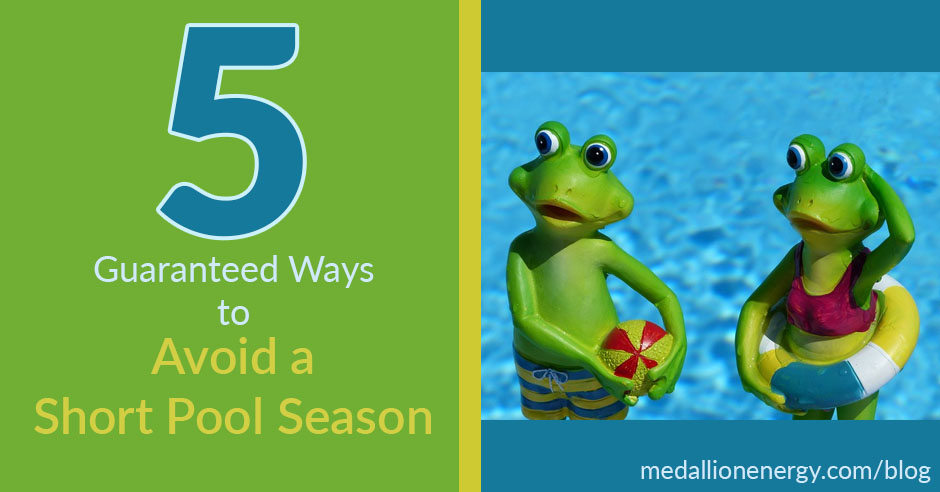There are a lot of things that can cut a great pool season short:
- Sudden cold weather
- A broken pool heater
- The filter pump not working
- The pool turning green
- Pipes bursting
And that’s just the most common stuff.
Point being, there’s a lot that can stop you from swimming when you want to. And if you’ve invested in something as special as a pool, then you should be getting the most out of it.
Luckily, there’s plenty you can do to avoid a short pool season. Small, but powerful changes that make all those common pool problems go away, so you can swim on YOUR time.
These are the secrets to keeping your pool equipment working flawlessly each season. Tiny habits that keep your pool cleaner and healthier — with less work and expenses for you to deal with.
If that sounds good to you, then keep reading to learn 5 guaranteed ways to avoid a short pool season. Follow all the tips in this post, and you can make your pool season up to 6 months longer.
5 Guaranteed Ways To Avoid a Short Pool Season
Keep your pool covered
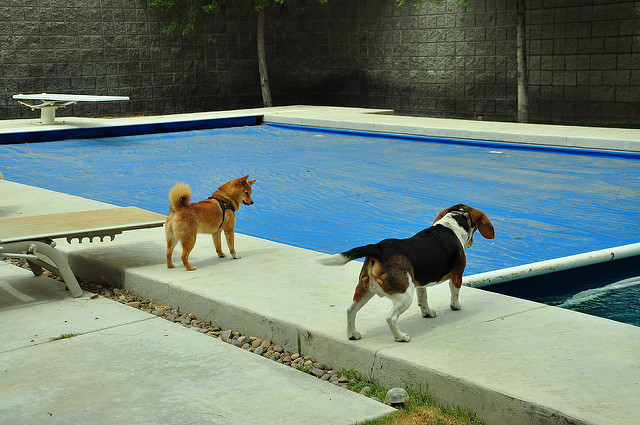


If you don’t cover your pool yet, here’s what you’re missing on:
- Avoiding excessive heat loss = cheaper monthly heating bills
- Avoiding excessive water loss = cheaper monthly water bill
- Preventing pool chemical overspending = UV protection from the sun means longer-lasting pool chemicals
Covering your pool is just like covering a pot of water. When you heat it up, the cover helps it warm up faster. And it prevents all of the water from evaporating — keeping more of it inside the pot.
Your pool is the same way. Covering your pool reduces heat loss by up to 75%. It also improves heating efficiency, so you don’t have to run your pool heater as often.
So with a covered pool, you enjoy faster heating and consistent water temperatures. At the same time, a cover also reduces evaporation, one of the biggest causes of swimming pool water loss (next to plumbing leaks and cracks).
As far as chemical waste is concerned, when you cover your pool you block out UV rays and solar heat, which affect chemical levels. So with a shield against the sun (a cover), the chemicals in your water last longer and work more effectively
And when your pool chemicals last longer, you spend a lot less money replacing them.
(But if you want to lower your pool chemical bills even more, and spend 70% less each year on chlorine, a salt-water chlorine generator is the perfect solution)
Choose on-demand pool heating
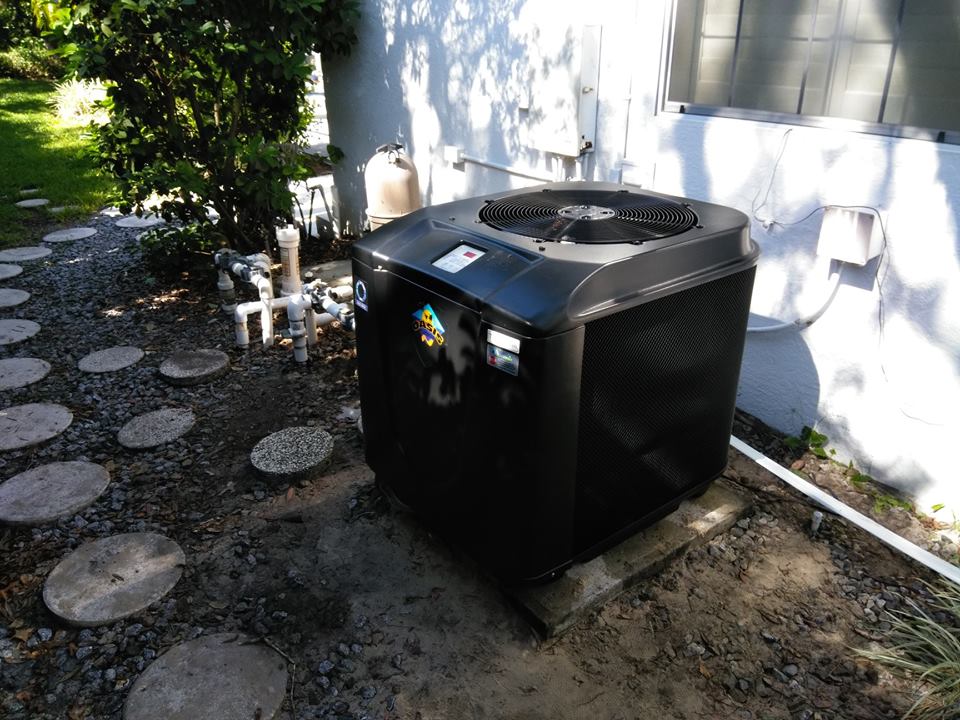


Having a pool heater changes everything. It affects how often you can swim, when you can swim, and even how long.
Which makes keeping your pool heated one of the best ways to avoid a short pool season.
Of course, that’s obvious. Which is why how you choose to heat your pool is what really matters. Not all pool heaters are created equal.
For instance, while the low monthly costs of solar pool heaters make them an attractive choice for pool owners, there are a few important things to remember:
- Every solar heater needs several hours of direct, steady sunlight to do their job properly.
- Solar heaters stop working effectively when the sun disappears
- They can’t keep your water warm when the weather gets too cold
So when it’s warm and sunny, you’ll have no problems with a solar heater.
But what about when it’s not? (Which is the case at least half the year.)
Ice cold water. And there go your chances of swimming.
On the other hand, heating options like pool heat pumps and gas heaters are different.
Pool heat pumps use electricity to harvest heat from the surrounding air, which allows them to work in temperatures as low as the 40s. So you can enjoy warm water on demand, whenever you want to swim. And certain models can even cool down your pool too, giving you full control over your water temperature all year long.
Gas heaters, well, burn gas. So naturally, they’re the most expensive, especially for anything bigger than a small pool or spa. But as long as you can afford to supply the gas, they’ll supply the heat. Pricey, and certainly not eco-friendly heat, but reliable heating nonetheless.
Point being, both pool heat pumps, and gas heaters can heat your pool year-round, whether the sun is out or not. A major benefit that adds several months to your swim time, and extends your pool season.
So if you want to avoid a short pool season, switch over to on-demand heating.
Related: 9 Ways Owning a Pool Heat Pump Improves Your Health & Life
Want to avoid cold pool water, in any weather, and swim year-round?
Service your pool heater & pump
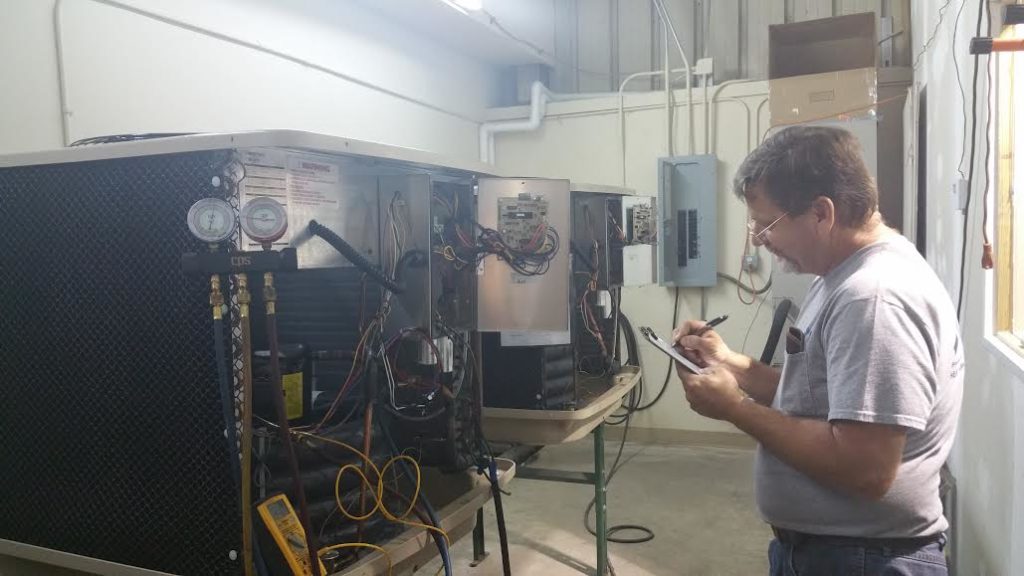


While the type of pool heater you choose plays a big role in the length of your pool season, there’s something even more important.
How well you take care of that pool heater.
Every pool heater runs great when you first get it. Smooth, no problems.
But with regular use, just like a car, your heater experiences wear and tear.
Wear and tear that reduces performance, and makes heating efficiency drop. And eventually, if neglected for too long, it leads to bigger heating bills, expensive repairs, and even complete unit failure.
All of that means more spending for you. Because a pool heater that isn’t maintained has to work harder and harder to keep doing its job.
And the longer it has to overwork, the more it struggles to KEEP working. And once your pool heater isn’t working properly, parts start breaking.
So in that situation, the easiest, and the most effective solution is to service your pool heater.
Regular pool heater maintenance:
- Keeps your heater in good shape
- Helps reverse the effects of regular use
- Ensures the best energy efficiency
- Keeps your pool heater working at maximum performance year after year
But best of all, it keeps your heating bills low and consistent — saving you money each month. And that’s a difference you’ll notice fast, and never want to ignore again.
The same logic applies to your pool pump. Especially since without your pump, your pool heater can’t work.
In fact, without your pump, the whole entire show shuts down. Your pool pump is essential to powering your filter system, heating your water, distributing pool chemicals, and keeping your water flowing.
If it malfunctions or stops working, so does everything else.
This makes it easy to see why servicing your pool equipment is one of the best things you can do as a pool owner. So if you want to avoid a short pool season and surprise expenses, make pool equipment & pool heater maintenance your top priority.
Related: 4 BIG Reasons To Service Your Pool Equipment
Use an Automatic Timer
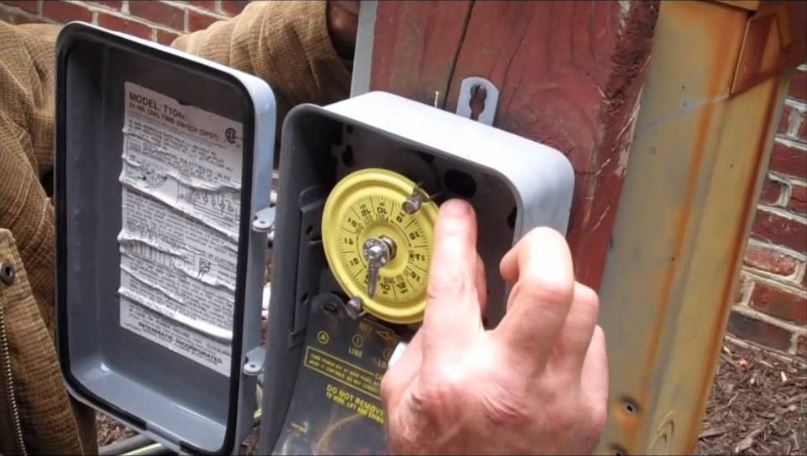


Here are a few reasons why installing an automatic timer is a really good idea:
- Helps you avoid freeze damage
- Keeps your pump & heater running on a schedule
- Conserves energy by improving efficiency
- Promotes good water circulation for a cleaner pool
You can add an automatic timer to your pool system and reap all of the time saving, energy-saving benefits it has to offer.
In the winter, automatic timers power on your pump and keep your water above freezing temperatures.
But they can also work on a schedule, to ensure that your pump and pool heater run each day, for cleaner water and better heating efficiency.
When you run your pump on a schedule, you’ll notice that doing so actually saves time and energy.
Think of it this way: when you keep your water circulating, your filter system continues cleaning your water. And the longer your water stays clean, the less you have to run your pump each day to keep it clean. So in short, the effects of regular cleaning stack up, and lead to an overall cleaner pool.
On a similar note, when you keep your water flowing, your pool heater can transfer heat and maintain water temperature more effectively.
Without an automatic timer, you might have to warm up your water 10-15 degrees each morning. But with a timer, your pool pump and heater stay working even when you’re away, so your water is always warm and clean. That’s pool automation made easy.
Related: 11 Simple Ways To Automate Pool Maintenance
Does saving 70% on chlorine each year & chopping your
pool maintenance work in half sound good to you?
Use a pool care schedule to keep your pool healthy all season long
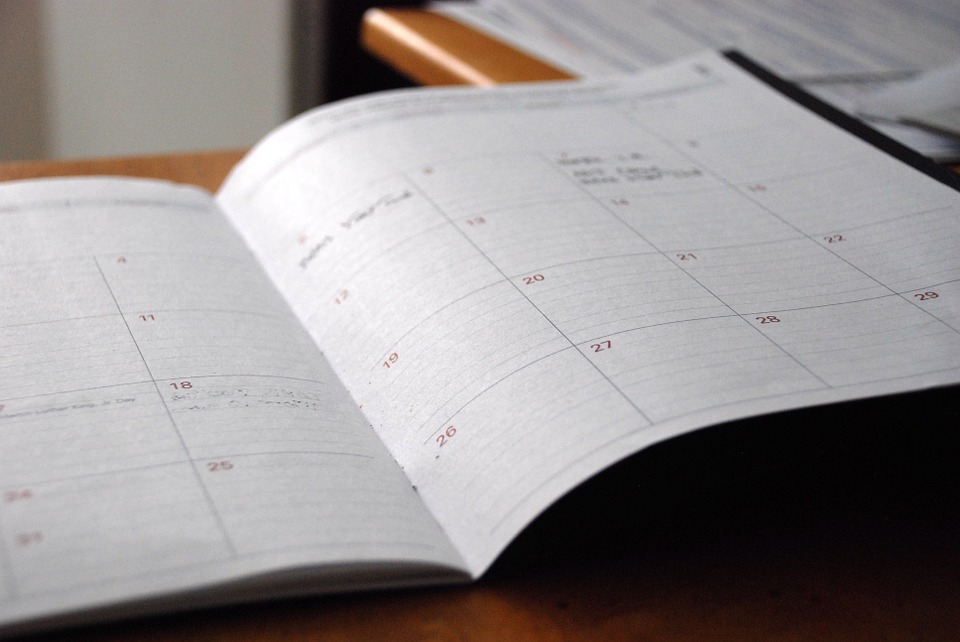


And if it’s too extreme or comes towards the end of the year, then it can sometimes be too much work to fix. And when that happens, pool owners more often close the pool and decide to deal with it later.
That’s months of swimming and great times going to waste.
But we get it, pool care isn’t always easy. It’s hard work, and sometimes, quite a lot.
That said, there are plenty of ways to lighten your workload, and cut down the time it takes to do everything by more than 50%.
The secret lies in the pool care schedule. With pool maintenance, consistency is HIGHLY rewarded.
The more often you clean your pool, the easier it is to keep it clean. But the longer you go without cleaning, the dirtier and harder it gets to clean. Simple enough, right?
So while your first week of pool maintenance might take 2 hours, the next week could only take 1, since the pool was already in great shape from the last week. And the cleaner your pool stays, the less time you have to spend cleaning it.
Related: 21 Pool Maintenance Mistakes That Are Wasting Your Time & Money
Closing thoughts on how to avoid a short pool season
The key to avoiding a short pool season lies in the preparation. Here are a few questions to ask yourself:
- Is my pool covered to help control water & heat loss?
- Am I using an on-demand pool heater (pool heat pump or gas)?
- Did I service my pool heater this year?
- Have I serviced my filter pump recently?
- Am I using an automatic timer to control pool equipment?
- Am I making pool maintenance easy on myself with a Pool Care Schedule?
If you answered yes to those questions, then you’re ready to get the most out of your pool this season. That means more swimming, more get-togethers, and more fun — on your time.
If you liked this post, you might also like:
How To Keep Your Pool Open During Winter
20 Common Swimming Pool Myths BUSTED
7 Best Ways To Lower Swimming Pool Bills By Up To 50%

